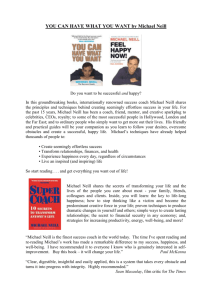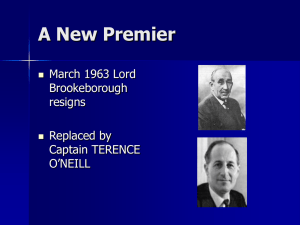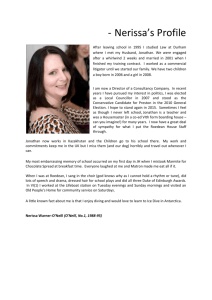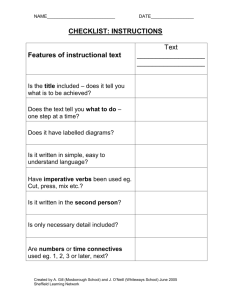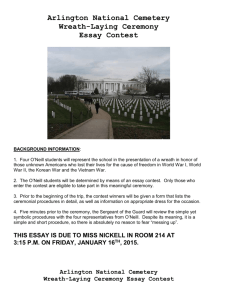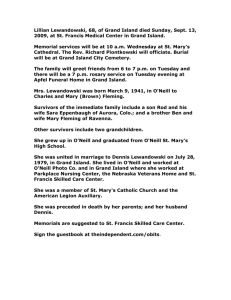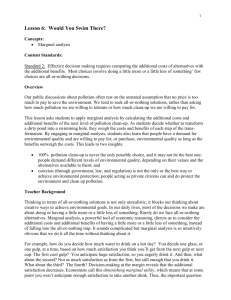Ms. O'Neill's Community Guidelines (ACTION)!
advertisement
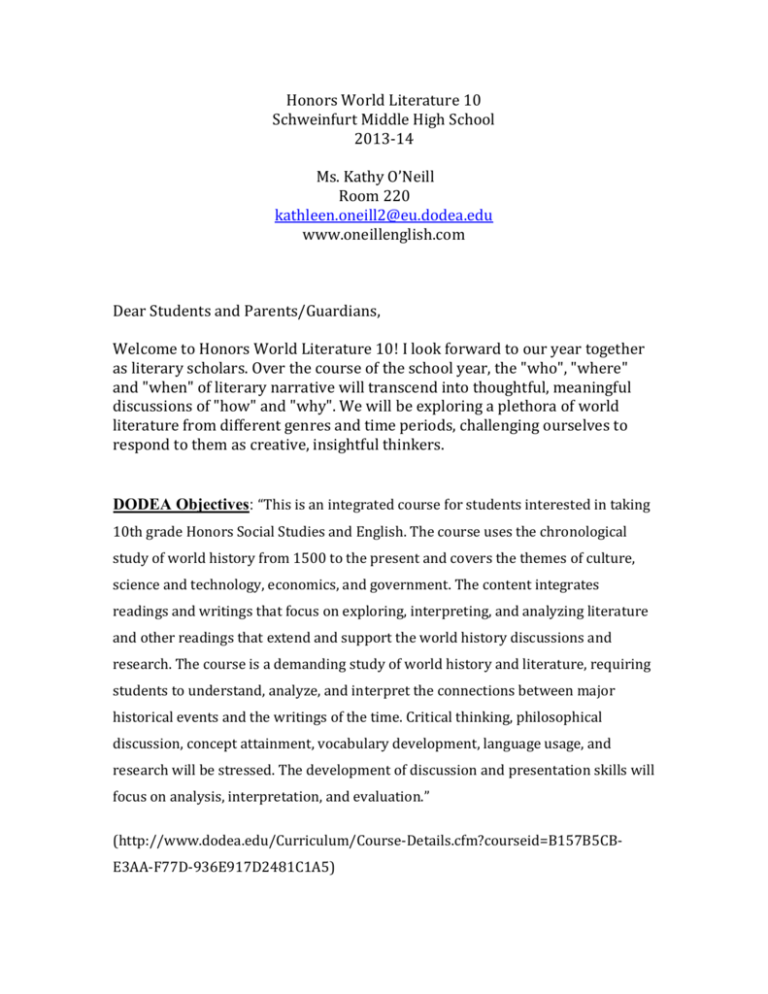
Honors World Literature 10 Schweinfurt Middle High School 2013-14 Ms. Kathy O’Neill Room 220 kathleen.oneill2@eu.dodea.edu www.oneillenglish.com Dear Students and Parents/Guardians, Welcome to Honors World Literature 10! I look forward to our year together as literary scholars. Over the course of the school year, the "who", "where" and "when" of literary narrative will transcend into thoughtful, meaningful discussions of "how" and "why". We will be exploring a plethora of world literature from different genres and time periods, challenging ourselves to respond to them as creative, insightful thinkers. DODEA Objectives: “This is an integrated course for students interested in taking 10th grade Honors Social Studies and English. The course uses the chronological study of world history from 1500 to the present and covers the themes of culture, science and technology, economics, and government. The content integrates readings and writings that focus on exploring, interpreting, and analyzing literature and other readings that extend and support the world history discussions and research. The course is a demanding study of world history and literature, requiring students to understand, analyze, and interpret the connections between major historical events and the writings of the time. Critical thinking, philosophical discussion, concept attainment, vocabulary development, language usage, and research will be stressed. The development of discussion and presentation skills will focus on analysis, interpretation, and evaluation.” (http://www.dodea.edu/Curriculum/Course-Details.cfm?courseid=B157B5CBE3AA-F77D-936E917D2481C1A5) Essential Questions: We will always attempt to answer these questions through our exploration of literature: How do we reconcile opposing forces in our lives, and the lives of others who have gone before us? How can readers use literary elements to interpret an author’s intended effect? How can we use world literature as a window into global cultures and religions? Through reading about other cultures, can we develop “world empathy”? Why is textual support and research crucial for supporting one’s viewpoint? Major Texts (these will be provided for you): Holt Elements of Literature – World Literature The Longman Anthology of World Literature (Volumes D, E, F) The Prince, Niccolo Machiavelli The Social Contract, John-Jacques Rousseau The Tempest, William Shakespeare The Taming of the Shrew, William Shakespeare Tartuffe, Moliere Great Expectations, Charles Dickens Things Fall Apart, Chinua Achebe All Quiet on the Western Front, Erich Maria Remarque Night, Elie Wiesel Fahrenheit 451, Ray Bradbury Required Materials Two Folders (one for class materials, one for in-class cumulative writing portfolio) Notebook Two pencils Two pens (one black, one colored) Any books/additional materials needed for the day (please see outside Room 220/course website) Your materials are due in class on Tuesday, August 27. Repeated failure to bring appropriate materials to class will result in a reduction of your participation grade. The materials needed for the day will always be listed outside Room 220. Grading: Per DODEA policy, you will receive one grade determined from work in this course and Mr. Geier’s Honors World History course (see honors contract). Cross-curricular projects and quarterly assessments will be developed and graded collaboratively by Ms. O’Neill and Mr. Geier. In addition, 25% percent of your final grade will be related to ELA standards. This ELA grade will be based on the following: Weekly Participation: This category will include class participation (written and oral), preparedness for class, and homework assignments assessed for completion. You will be assigned a weekly grade based on the following point value: 10: Outstanding 9-8: Excellent 7-6: Satisfactory 5-4: Needs improvement 3-0: Missing participation Projects/Assignments: This could include group presentations, extended close reading/writing assignments, individual projects, etc. Timed Essays: On every other 50-minute “C” day we will be taking a timed essay test, with the alternate “C” days reserved for writing workshops/quizzes. Although some of these in-class essays will receive an additional grade from a peer, Ms. O’Neill will be giving the final grades/feedback on all written work, using a holistic, preparatory Advanced Placement rubric (see attached). Writing workshops will help you hone specific skills before you write, and provide specific feedback on areas of concern after you write. Our writing workshops will include (but are not limited to) the following topics: Syntax/Sentence Structure Formulating Arguments o Generalization vs. Specificity Introductions/Conclusions Paragraph Order o Transitions Verb Tenses/Active Verbs Supporting Evidence o Application of Literary Terms Academic/Writing Vocabulary Pre-writing Strategies o Graphic Organizers o Time Management – Outlining vs. Writing Unit Essays: Formal, analytical responses of 6-8 pages will be assigned at the end of each thematic unit and/or major text. These papers will challenge you to examine thematic issues through the social, cultural, and historical lenses of literature. Close textual explication and interpretation are required in these essays. You will be required to use literature covered in the unit (novels, short stories, poetry, etc.) to formulate these arguments. While work on these essays will be required outside of class, there will also be time set aside for peer reviewing and writing workshops targeted specifically towards these essays. Reading/Editing/Vocabulary Quizzes: Ms. O’Neill will be giving pop quizzes on assigned readings. Please make sure you come to class prepared and having done the reading – no skimming or SparkNotes surfing! To practice your editing skills, you will also be taking quizzes that challenge you to edit papers based on your knowledge of grammar, syntax, and structure. In preparation for the PSAT/SAT, we will also be reviewing Greek and Latin roots, along with a selection of College Board -recommended vocabulary words. Absences/Late Work: You are expected to be in class regularly and punctually. Major assignments (papers, etc.) MUST be turned in on the day there are due. If you are not in class, please email your work to Ms. O’Neill (kathleen.oneill2@eu.dodea.edu ) or submit your work on the course website (http://oneillenglish.com) on the day the assignment is due. You will have one class period per absence to make up smaller assignments (reading responses, etc.). THERE WILL BE NO LATE WORK ACCEPTED IN THIS COURSE. Please see me, of course, in an emergency (my dog ate my homework does not constitute an excuse). Just Say No: Although I will encourage our classroom to be a place of positivity and “yes”, the following will be prohibited: *iPods/phones/other electronic devices *Gum *Food and non-water drink (unless previously approved by Ms. O’Neill) *Tardiness *Cheating/Plagiarism (see statement below) *Disrespect to Ms. O’Neill or your classmates (see A-C-T-I-O-N statement) Repeated violation of these rules will result in school-sanctioned disciplinary procedures (detention, in-school suspension, etc.). Academic Honesty (Cheating and Plagarism) Cheating and plagiarism are considered very serious offenses. Per school policy, if a student is found participating in these offenses a zero (0) or partial credit will be given for the assignment and the parents will be notified. Academic dishonesty includes copying homework or answers from another student’s test, sharing tests or teacher material, and plagiarism from either electronic or print material. The student has the right of appeal. Respect Clause We will discuss many sensitive topics in our study of literature. While active debate is encouraged in our classroom, we will respectfully honor differences in opinion. Any person who issues disparaging and prejudicial remarks in our classroom will receive disciplinary consequences. I am looking forward to working with all of you over the course of our year together as partners in literary sleuthing! Happy Reading, Ms. O’Neill Ms. O’Neill’s Community Guidelines (A-C-T-I-O-N)! A - Accelerate every day Build upon your knowledge and become a stronger leader every day. Examples: o Extending written responses o Participating verbally in class Non-examples: o Having late/missing assignments o Refusing to participate in class o Failing to build upon prior knowledge C- Communicate with Ms. O’Neill and your classmates Check in with each other and with Ms. O’Neill to reveal any struggles with class material (or school life in general). Examples: o Seeking out individual help from Ms. O’Neill o Informing Ms. O’Neill of outside factors that would prevent your best classroom effort (ex. a death in the family) o MAKING USE OF YOUR RESOURCES!!! (Information Center, Homework Club, Seminar, AVID, Counseling Department, etc.) Non-examples: o Staying quiet about problems you are aware of o Failing to engage with fellow group members on a project T- Talk and listen with purpose and authority There is a right time and a right place to talk. Remember that whenever you speak, you are speaking with the purpose of sharing information with others. In our classroom, this information should always be on-task and meaningful. When others are speaking, you need to show them the same courtesy and respect that you would want shown to yourself. Examples: o Raising hand/patiently waiting to be called on o Listening intently to a speaker by making eye contact and facing towards speaker o Staying quiet while others are speaking Non-examples: o Talking while another classmate or Ms. O’Neill is speaking o Going off topic in discussions I- Impress yourself and others In order to achieve any type of success in life, you must first open your mind to new knowledge and experiences. Right now, make positive goals for yourself as a learner and work hard towards achieving them – when you come from a place of “yes”, anything is possible! Examples: o Writing out three short-term and three long-term goals at the beginning of the school year, and creating checklists of steps that you can take in order to achieve those goals; three of Ms. O’Neill’s high school goals included making first chair in band, applying to the University of Illinois, and getting motivated to study math! o Participating in monthly reflective journals reflecting on your progression towards those goals Non-examples: o Failure to participate in reflective journal activities o Failure to actively pursue your goals – avoid that sinking feeling in your stomach that says you’ve let yourself down! O- Organize and prosper Organization is a great tool that you can use to find success – both in this classroom, and for the rest of your life. Examples: o Filling out agenda/planner regularly o Organizing papers/notes into binder o Using study aids (flash cards, Cornell notes, etc.) o Bringing appropriate materials to each class Non-examples: o Refusing to fill out agenda/planner o Losing homework/papers on a consistent basis o Failure to bring appropriate materials to class N- Navigate with enthusiasm You should bring excitement, effort and a proactive, positive attitude into class every day. Examples: o Greeting Ms. O’Neill and fellow students as you enter the classroom o Congratulating fellow students on their achievements (“I loved your speech!”, “Great job at the football game last night!”) Non-examples: o Laying head down on desk during class time o Making negative comments to fellow students I have read the course syllabus and understand my role and responsibilities as a member of Ms. O’Neill’s Honors 10 World Literature class. Student Signature: _______________________________ Date: ________________________________ Parent Signature: ________________________________ Date: ________________________________ Please return this signed sheet to Ms. O’Neill in class on Tuesday, August 27.
